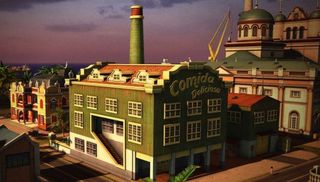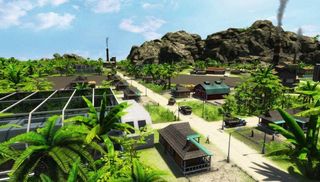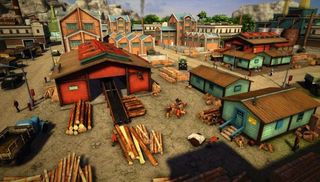Tropico 5 first-look: become a dictator and build a despotic dynasty in this reformist sequel

Some buildings can be repurposed in later years. A military fort can be both the bulwark of a colonial city, and the tourist centrepiece of a modern one.
In this way Haemimont hope to enable players to experience the development of their city, and to imbue their choices with far-reaching consequences. The effects of one era can be felt in the next, as the political and societal landscapes shift. Based on the dilemmas I was shown, it seems unlikely that careless play will completely sabotage the late-game stages, but the number of possibilities suggest that sound planning will be rewarded, and that small variations can lead to a diverse set of problems to solve as the game unfolds.
An island's constitution provides another way for players to define their rule. After leaving the colonial era, you enter the World Wars phase, where your tiny banana republic must thrive amid the turmoil of warring superpowers. It's at this point that the game starts to more closely resemble previous Tropicos, as the island's ruler takes the familiar title of El Presidente. It's also here that players set the founding tenets that will come to shape their future civilisation.
The constitution is designed to be a lasting and slowly evolving document – alterations to it are only possible after a ten-year period. Once again, your choices will have a lasting effect of positives and negatives. Male-only voting rights might ensure easier election victories and a stronger military, but increase the chance of a revolution from the disenfranchised population. The changing eras have an influence here too. The religious faction will initially be thrilled and further bolstered by a declaration of theocracy, but even they will become unhappy if it persists through to the modern age.

Certain game systems will ask you to make difficult decisions within individual eras. Trade offers enable players to take advantage of timelimited offers of increased value for goods and resources. In the World Wars era, steel is a key resource that will be in higher demand during periods of international conflict. The dilemma lies in whether you want to gear your industrial production to take advantage of the economic potential, only to be lumbered with a less efficient industry when the demand lowers. Trade can bring further unintended consequences. Bootleg liquor is another valuable commodity during this early era, one that can be smuggled to the USA as it struggles to enforce prohibition. It sounds profitable, but comes at the cost of an influx in organised crime.
If this is all starting to sound distinctly un-Tropican, it's more a case that these new features are designed to build neatly onto the series' familiar elements. The returning systems have been fleshed out to provide an added purpose to their role in the game. A case in point is the Swiss bank account, which in previous Tropicos served only as the player's score. Here, the money that you embezzle can be used to level up El Presidente's dynasty.
Rather than a single ruler, in Tropico 5 you're responsible for an entire family. Not only will they walk and work around the island, they can also be selected to trigger an election and take over the presidential role. Each member of your dynasty will have different, upgradeable attributes that can be beneficial at certain times throughout the life of a city. Maybe you'll want an economic leader to make the most of a particular trade deal, or a diplomatic one to cool tempers and hold off a foreign invasion.
PC Gamer Newsletter
Sign up to get the best content of the week, and great gaming deals, as picked by the editors.

During one such election, Dyankov was trailing heavily in the polls. The resulting workaround was a promising example of how the new systems will enhance the old. On course to lose the election, his only solution was to enact the martial law edict. To do this, a city needs three barracks—something time and economy wouldn't allow. Dyankov was able to raise the necessary funds by borrowing bonds from international capital markets. With the barracks ordered, he could speed their construction through new, expanded options for building management. Increasing funding for the construction office ensured quicker build times on the barracks – enabling a declaration of martial law before the election results were called.
It was a classic Tropico move. The economy was in ruins, the people were incensed, but, most importantly, El Presidente was still in power. Tropico 5 may be the energetic young reformist with fresh ideas and smart innovations, but it seems set to be as delightfully corrupt as ever.

Phil has been writing for PC Gamer for nearly a decade, starting out as a freelance writer covering everything from free games to MMOs. He eventually joined full-time as a news writer, before moving to the magazine to review immersive sims, RPGs and Hitman games. Now he leads PC Gamer's UK team, but still sometimes finds the time to write about his ongoing obsessions with Destiny 2, GTA Online and Apex Legends. When he's not levelling up battle passes, he's checking out the latest tactics game or dipping back into Guild Wars 2. He's largely responsible for the whole Tub Geralt thing, but still isn't sorry.

Morels: The Hunt 2, an intensely chill game about gathering mushrooms and taking pictures of animals, is my unexpected new obsession

Dwarf Fortress's graphical adventure mode launches today, includes extremely Dwarf Fortress touches like '186 animal people portraits' and a unique sound effect for walking on soap
Most Popular


